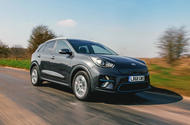We run down the very best affordable electric city cars, superminis and famliy hatchbacks on sale in Britain today
Electric cars are more popular today than they have ever been. And why wouldn’t they be? An electric vehicle (EV) lets you travel in silence and produces zero emissions. You don’t have to pay road tax, London dwellers don’t need to worry about the Congestion Charge, and the government will even give you a grant to buy one.
As the range between top-ups increases and the charging infrastructure improves, an EV is already a viable alternative to petrol- or diesel-fuelled models for a significant portion of British drivers. However, the EV market is still very much in its infancy, and choice is proving slow to grow.
Having first appeared around ten years ago, the market’s first EVs were cars with around 80 miles of usable range, priced at a 50 per cent premium over their petrol-fuelled counterparts. Today, in many cases, real-world range has more than doubled and that price premium has almost disappeared.
This is a list of our top ten affordable electric cars compiled considering factors such as range and usability, driving dynamics and value for money. Some are still subject to relatively high prices compared to combustion-engined cars, but their premiums can be offset against lower running costs.
Best Affordable Electric Cars 2019
1. Kia e-Niro
Along with its sister car, the Hyundai Kona Electric, the Kia e-Niro redefines how much real-world range we should now be expecting from an electric vehicle towards the more affordable end of the price spectrum. For around £35,000, the 64kWh battery pack common to both enables them to comfortably travel 230 miles on a single charge. A few years ago, that would be the sort of range you’d be expecting from something far pricier, and probably with a Tesla badge on its nose.
That genre-challenging relationship between range and affordability isn’t the sole reason why the e-Niro now crowns this list. Indeed if it was, the Hyundai Kona would be right up there, too. Where e-Niro pulls ahead, though, is that it also remains a thoroughly useable, pleasant-to-drive electric vehicle. It’s roomier than that of its relative, and it rides and handles with a greater level of sophistication and commitment. It may lack some of the accelerative potency of the Kona off the line, but as a well-rounded, truly usable affordable electric vehicle, the e-Niro is going to take some beating.
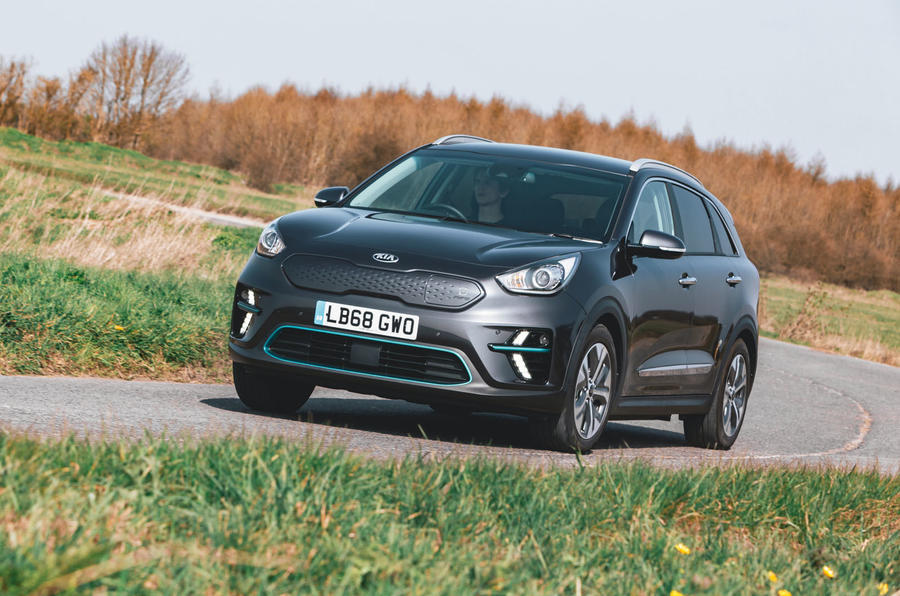
Save money on new e-Niro deals from What Car?
2. Nissan Leaf
The Nissan Leaf, in first-generation form, set the mould for the affordable electric car approaching a decade ago – and in new second-generation form, it’s back on the top of the pile of contenders who are following in its tread marks.
Having had a 25 per cent boost on battery capacity, the Nissan now leads many of its rivals with a WLTP-certified range of 168 miles. It’s also got significantly more power and torque than its direct predecessor; performs fairly keenly; feels like a more rounded car to drive generally; and has one of the strongest showings here on daily-use practicality for a small family.
A value proposition that’s also improved, and is now on a par with that of a mid-market, conventionally fuelled family hatchback once you take the government’s £3500 PiCG grant into account, cement the car’s market-leading position. It’s our default recommendation for anyone looking to simply replace their fossil-fuelled family hatchback with an electric one well-capable of doing the same job – and doing it well.
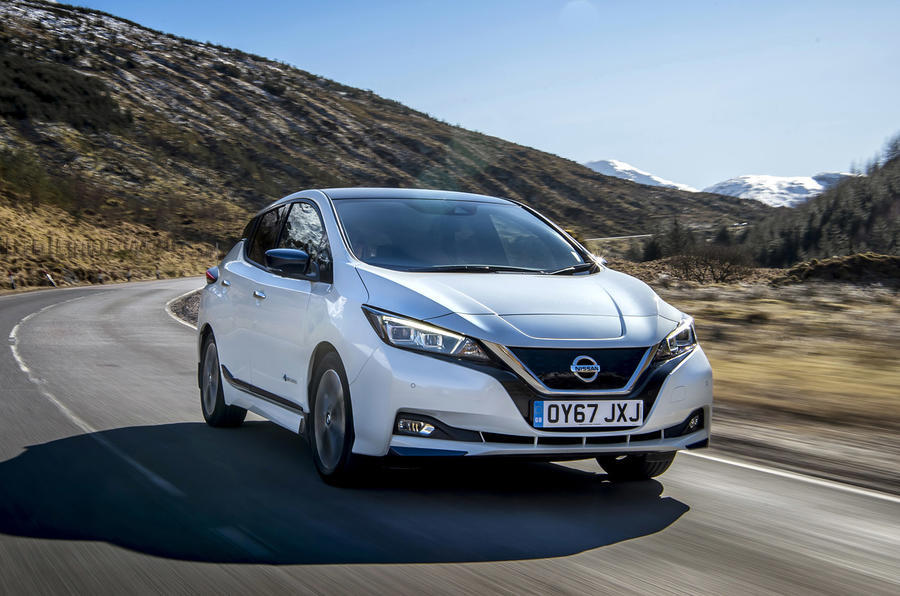
Save money with new Leaf deals from What Car?
3. Hyundai Kona Electric 64kWh
Until quite recently, an electric car good enough to combine a genuine 300-mile daily-use range with a sub-£30,000 price point seemed an awfully long way off. The Hyundai Kona Electric has made it a reality, however; quite a coup for its aspiring Korean maker.
By wielding what must be a sizeable competitive advantage on battery buying power, Hyundai has delivered this car to the road with 60 per cent more onboard electrical storage than either of the cars by which it’s bracketed in this list. That’s enough for more than 250 miles of range at typical UK motorway speeds, or more than 300 at a slightly slower clip or around town. And, in this car, it comes packaged with much stronger accelerative performance than its nearest rivals. The Kona Electric is quick enough, even, to live with some hot hatchbacks away from the traffic lights.
That the car’s slightly low-rent, restrictive interior doesn’t make it quite the match of a full-sized family hatchback on practicality is a bit of a disappointment. Also, there’s some frustration to be found in the car’s ride and handling, which both feel somewhat compromised by its weight and the low-friction tyres it uses.
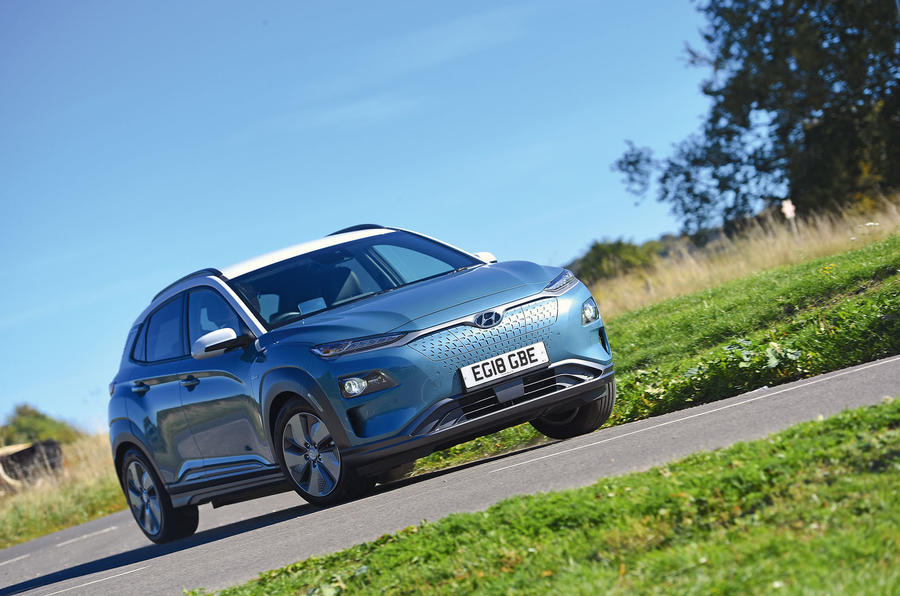
Save money with new Kona deals from What Car?
4. Kia Soul EV
Kia’s boxy compact crossover is back for a third-generation, but this time around the Soul will be offered exclusively as an electric vehicle in European markets. While it’s yet to touch down in the UK, initial impressions are very promising indeed.
While not particularly sporty, it rides well and doesn’t make too much of a point of its 1682kg kerb weight. And because it makes use of the same powertrain as the slightly bigger e-Niro, it promises a WLTP-certified range of 280 miles when equipped with a 64kWh battery. It’s rather convenient, then, that this is the only battery Kia will offer here in Britain when it goes on sale next year.
We’re yet to have prices confirmed, but initial reports suggest it’ll still cost more than £30,000, and will only be a few thousand pounds cheaper than the e-Niro, which offers slightly more in the way of practicality. A UK drive could well see the Soul move further up this list. Watch this space.
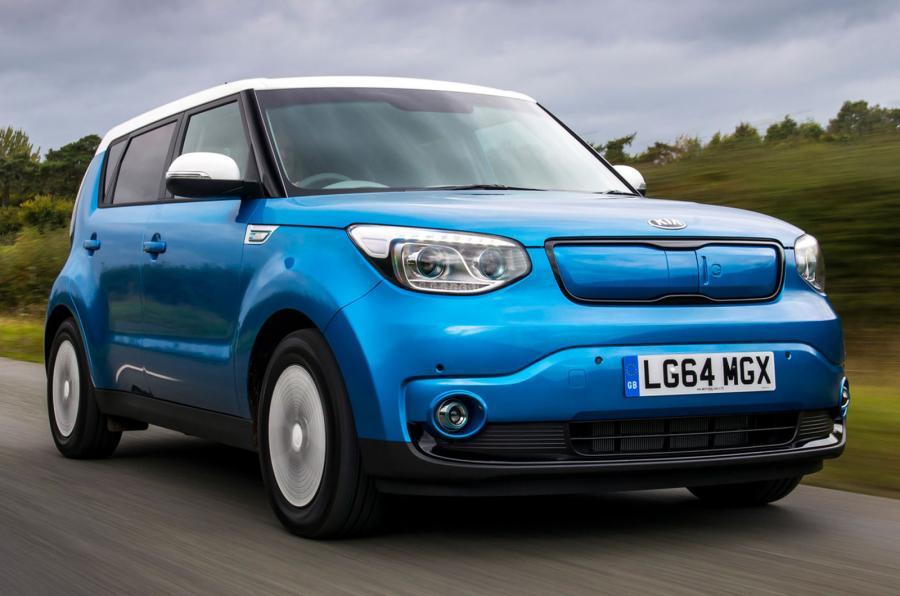
Save money with new Soul deals from What Car?
5. Renault Zoe R110
The Renault Zoe was always an appealing short-hopper electric supermini, even when it was offered with a 22kWh battery and had only 80 miles of real-world range. The car’s usability was enhanced during a mid-life update, however, by a 41kWh battery option which, on a warm day, turns the car into one good for 150 miles of mixed real-world use.
The Zoe offers strong value for money against its competitors, with battery lease options making ownership that big more accessible and the UK government’s PiCG incentive bringing the car’s entry price down below £20,000. It’s also pleasing to drive: very nippy and fairly quiet – albeit with some leaden feel to the controls, and some quickly gathering body control problems at higher A- and B-road speeds.
Renault’s battery hire option spreads out cost of ownership (although it has been blamed by some for doing more harm than good to the residual values of electric cars generally), and the car’s price includes installation of a fast-charge port at home.
Unlike other EVs, the Zoe isn’t one that can be rapid-charged at the motorway services quite as quickly as certain rivals, and that does erode its usability somewhat. Even so, the Zoe remains a fine entry point into EV ownership.
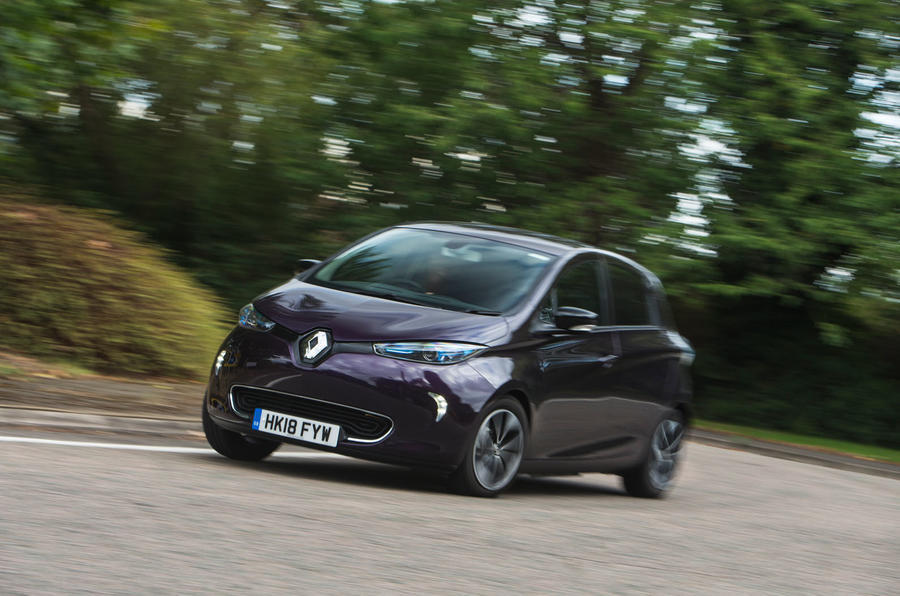
Save money with new Zoe deals from What Car?
6. Volkswagen e-Golf
Perhaps the biggest complement you can pay the e-Golf is that it feels much like any other Golf. It occupies the same dimensions as other seventh-generation five-door models; aside from a slight reduction in boot space due to the underfloor lithium ion batteries, it’s just as practical; and it can be bought for less than £30,000 after government purchase incentive, so it’s only as expensive as an upper-mid range Golf with a petrol or diesel engine.
The e-Golf is powered by a 134bhp motor that delivers 199lb ft of torque, with 33.2kWh of usable battery capacity offering a claimed NEDC range of up to 186 miles; which is more like 120- in real-world use.
Performance is as strong as you’d expect to find in any typical five-door hatchback, and considerably better at town speeds, while the car’s handling disguises its mass very cleverly and its practicality is strong.
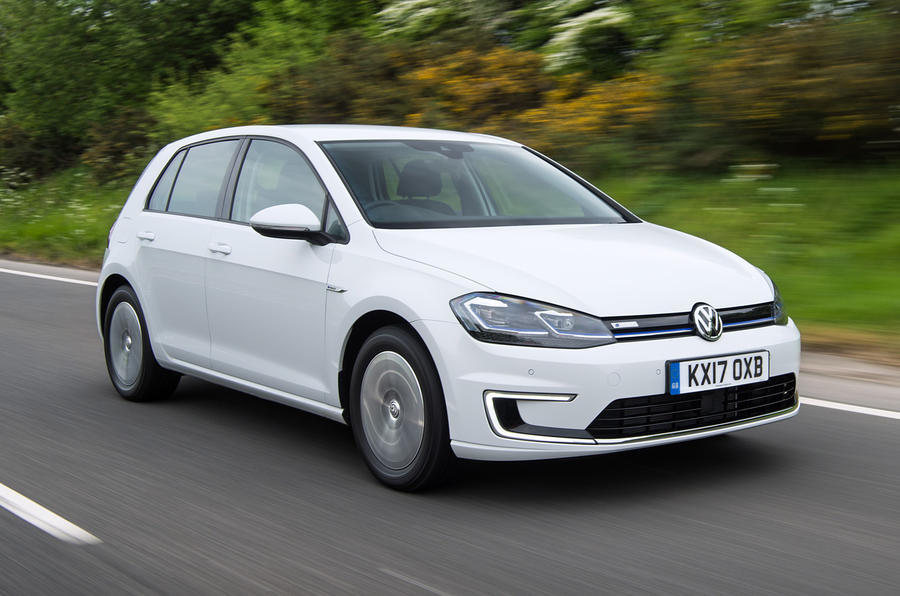
Save money with new Golf deals from What Car?
7. BMW i3
The i3 has a rare quality for an electric car: multi-faceted appeal. You might want one because of the way it looks, or for the spritely, involving way it drives; and either way, you might not actually care much that it’s electric, such is the power of the car’s various lures.
While the i3’s short wheelbase can make it feel a touch nervous on motorways, its keen handling ensures it thrives in the urban environment for which it’s designed.
That’s helped by its innovative carbonfibre-reinforced plastic chassis, which ensures the car is remarkably light. The 168bhp electric motor (rising to 181bhp for the i3S) offers peak torque at zero revs; and so, although the car’s top speed is only 99mph, it has strong performance getting there which wouldn’t shame a warm hatchback.
Using that performance does impact on the car’s true electric range, although the addition of a 42.2kWh battery at the beginning of 2019 has finally taken the i3 through the 150-mile barrier on real-world range.
Until recently BMW offered a range-extender version with a backup petrol engine, but it discontinued the i3 REX in 2018.
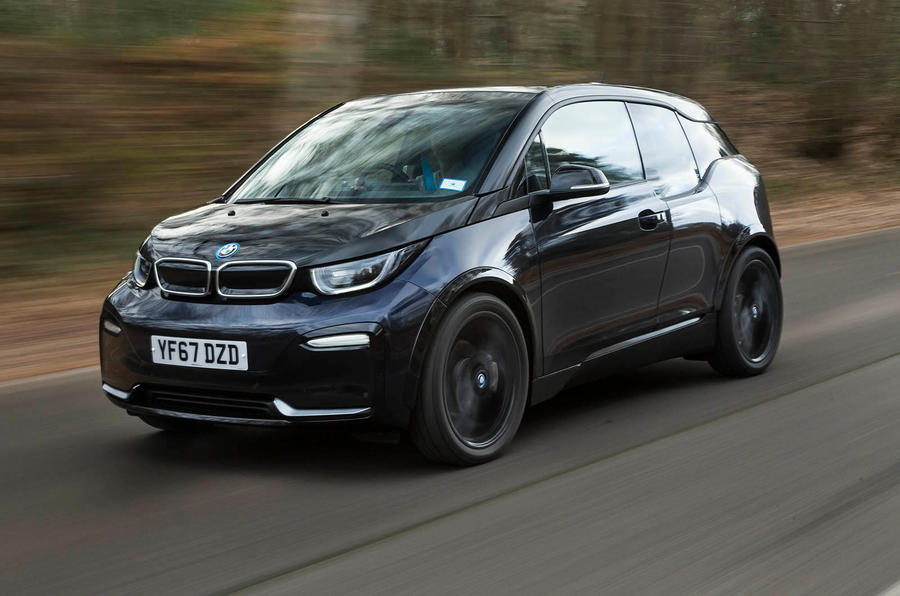
Save money with new i3 deals from What Car?
8. Hyundai Ioniq Electric
The Hyundai Ioniq is a bit of a rarity amongst family hatchbacks in that it’s available with choice of electric, petrol-electric hybrid and plug-in hybrid powertains.
The EV version does without the independent multi-link rear suspension of the others, in order to pack in a 28kWh lithium ion battery pack which makes for a real-world range in the region of 120 miles.
The Ioniq EV produces just 118bhp, but with 218lb ft of torque it can reach 62mph in under 10 seconds. Driving dynamics aren’t bad, but won’t set your pulse racing: the steering has reasonable weight but is somewhat vague, and this is a car happiest being driven well within its limits.
As EVs go, the Ioniq is practical and good value with decent usable range, and worth considering against rivals such as the Nissan Leaf and BMW i3 if you’re going to make regular use of the back seats and boot.
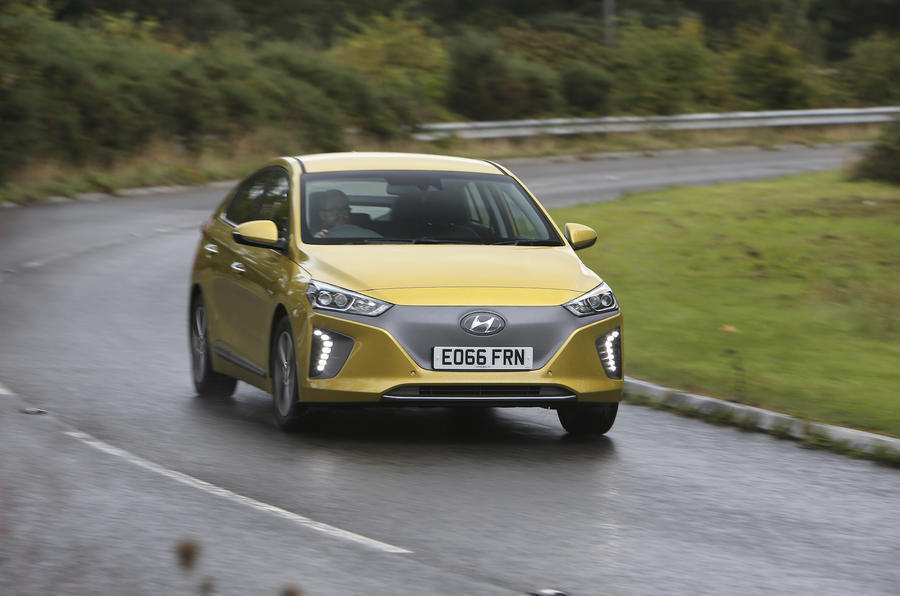
Save money with new Ioniq deals from What Car?
9. Opel Ampera-e
The original Vauxhall Ampera was a range-extender plug-in hybrid with a separate petrol engine, but the model name has now been applied to a smaller, purely electric hatchback. Partly as a result of General Motors’ sale of the Opel/Vauxhall business to French automotive group PSA Peugeot-Citroen, it never went on sale in the UK, although a left-hand drive example could certainly be imported.
The Ampera-e features a notably high-capacity battery pack, with 288 cells delivering 60kWh: enough for a claimed range of 236 miles on the WLTP schedule. The car’s seating-position is MPV-high, the interior is stylish and there’s good rear legroom and a decent 381-litre boot. With 201bhp and 266lb ft of torque, it’s pleasing to drive, and good value for money being priced from the equivalent of £30,000 in Germany.
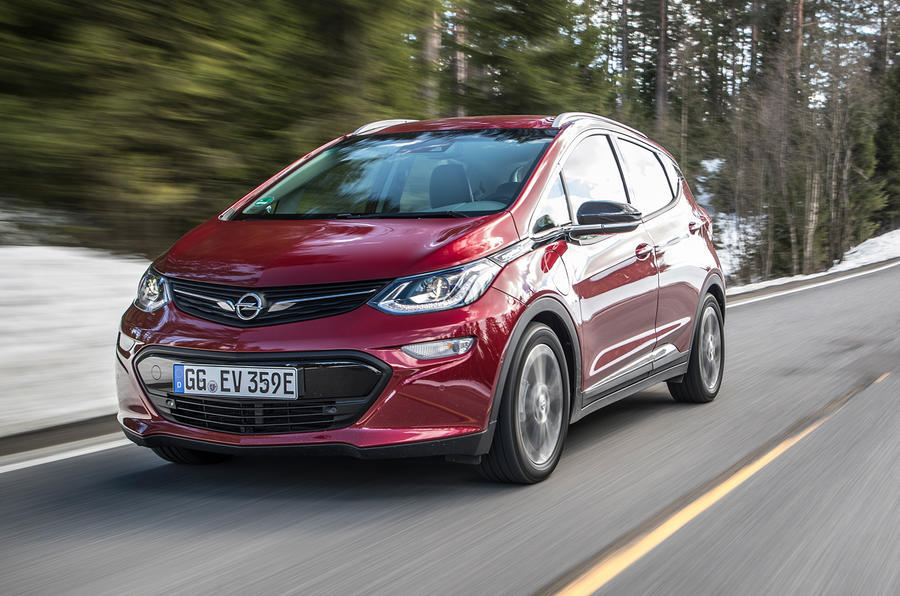
10. Volkswagen e-Up
As with the e-Golf, Volkswagen has based this EV on its existing city car in order to drive down costs through shared parts.
And driving the e-Up will certainly feel familiar to those familiar with the conventional version: the 81bhp motor sits up front, and the additional weight of the 230kg, 18.7kWh battery pack doesn’t affect the ride too much, even if the steering lacks feel. Claimed range is 75-100 miles.
Mechanically well-executed, but the compact size makes it an expensive option that lacks usability compared with some.
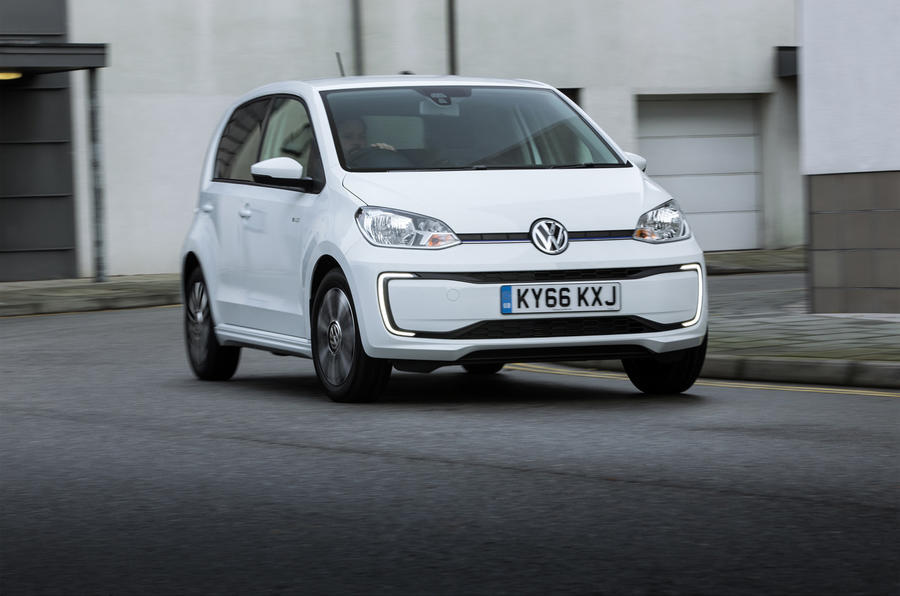
Save money with new Up deals from What Car?
Read more:
10 Best Premium Electric Cars 2019
Source: Autocar
